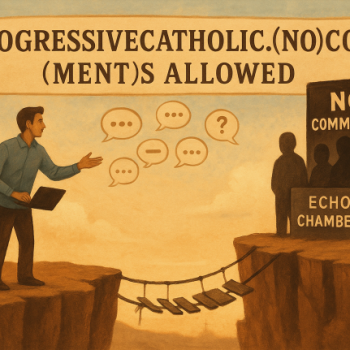GODSTUFF:
‘IT’S NOT AN ACT OF GOD, IT’S AN ACT OF GUYS’
Lost faith. False hope. Miracles and mistakes.
All have been on my mind as the story of tragedy — then hope — then tragedy mixed with betrayal (by the media, by the mining company, by God) unfolded this week at the Sago mine in West Virginia.
What must those good people at Sago Baptist Church have been feeling? The folks who were singing “Amazing Grace,” offering prayers of thanksgiving, and preparing a potluck to end all potlucks for a dozen coal miners trapped for nearly two days in the mine and, they were told, miraculously found alive. The folks who learned their miracle was a mistake.
A horrible, cruel mistake.
The miners weren’t coming to the church for a celebratory feast. They were never coming home. They were dead.
The video images of Anna Castro, a middle-aged woman whose cousin died in the mining accident, screaming at the television cameras, screaming at God: “We had a miracle and it was taken away from us!” are haunting. In the small Appalachian town where Christian faith is part of the fabric of the community, they “don’t even know if there is a Lord anymore,” Castro said.
She was given false hope. At least that’s what a lot of people are saying. False hope, as if someone gave her a syringe full of Kool-Aid instead of antivenom for a rattlesnake bite.
False hope. Is there such a thing?
I sat at my desk Thursday trying to decide which theologian or rabbi or priest or imam I would call to ask that question: What is false hope? What happens when miracles turn out to be mistakes?
Lots of people came to mind, good men and women gifted in all things pastoral, experienced in dealing with grief — that of others and of their own.
But I wanted something grittier. Something real-er. The truth — straight up, no twist.
So I called Studs Terkel.
He’s like Yoda. Ancient, sage, and irascible, with a deep well of irreverence and an unquenchable thirst for justice, particularly on behalf of the common man. Like migrant farmers or taxi drivers or coal miners.
Studs, who is a remarkably sprightly 93 (and a half) despite having had open-heart surgery over the summer and taking a nasty fall down the stairs in 2004 — he describes it as balletic choreography gone awry, “like Bob Fosse, kind of jazzy” — wrote a book not too long ago called Hope Dies Last: Keeping the Faith in Troubled Times.
So I figured he knew a little bit about the subject at hand, even though he’d be the first to tell you he’s an enthusiastic agnostic. Still, he’s a fan of religion and some of his best friends are believers.
As I walk into his living room, Studs is sipping a Scotch on the rocks, waving a copy of the morning’s paper, where he’s circled several paragraphs of the mining disaster story in black ink, and railing about misguided media coverage.
“The message is wrong,” Studs tells me. “There’s no mention of the fact, hardly — a throw-away mention at best — that there were a couple of hundred irregulations and violations by this outfit!”
He’s talking about the 208 federal safety violations the Sago mine was cited for last year, according to U.S. Labor Department statistics. Of those violations, which included citations for high levels of combustible materials, the largest single fine was $440 and the lowest was $60, according to news reports.
“It’s not an act of God, it’s an act of guys — guys exploiting other guys!” Studs spat, righteous indignation flushing his already rosy cheeks. “Ya see, when you say, ‘false hope,’ you hope that God was on their side. And it’s not an act of God, it’s an act of man! There were a couple hundred violations and who oversees that? . . . And if they’re fined 250 bucks it’s like two cents.”
The real false hope, and Studs believes there is indeed such a thing, was not that families were told a dozen men who were already dead were alive, but the circumstances that led to their deaths in the first place.
“False hope is [believing that] the company is taking care of all the regulations. It’s man who betrayed, not God, unless you look as God as a certain force, as I do . . . God in every person. We have the potential to be brighter than we are. We have the potential to be better than we are. And that’s the God in us, to me.”
What would he say to Anna Castro if he had the chance?
“Boy, in the first place, I couldn’t. I mean, how could you because grief is so personal, as I know,” Studs says. His wife of more than 60 years, Ida, died in 1999. He still gets emotional when he talks about her. “If you believe in a God and it’s a God of love and miracles, well then, by all means. If you believe in a hereafter and you meet your beloved ones, by all means. If it gives you solace, that’s plenty good enough.
“But to say ‘false hopes,’ false hopes is that guy on TV who was saying that things for miners are much better today than they were 30 or 40 years ago. False hope is that there would be no accident such as this. . . . False hope is that all those violators would have been kicked out of business long ago, and if anything, criminally tried.”
Making sure everything possible is done to prevent tragedies like the Sago mine from happening again would be a miracle, he says.
“To see that these regulations are fulfilled and that work is easier and safer for the fathers and the sons and the brother and the uncles — I don’t know what else you can offer?”
True hope.
And the straight dope.
Copyright © The Sun-Times Company
All rights reserved. This material may not be published, broadcast, rewritten, or redistributed.















